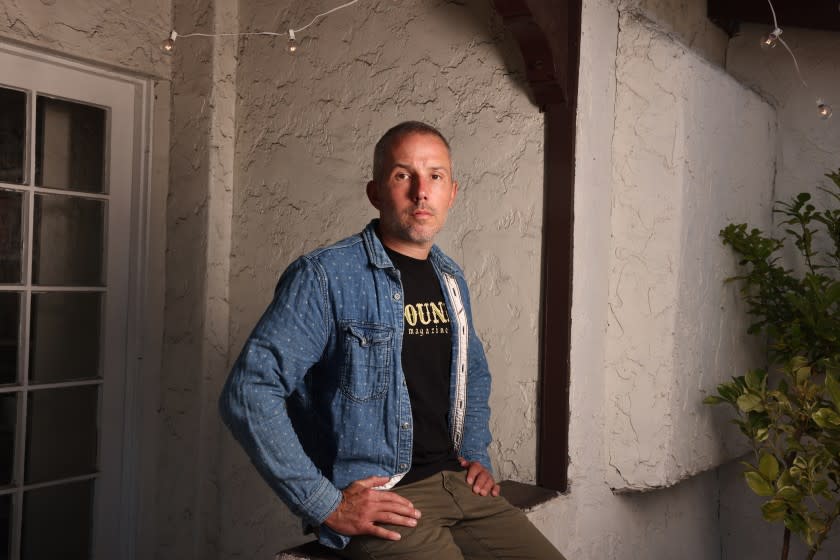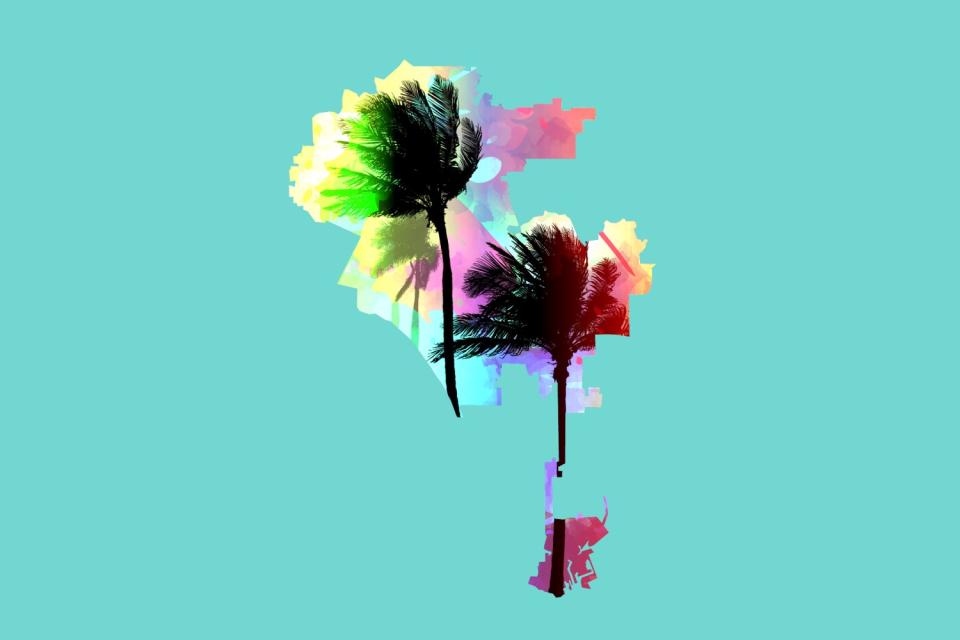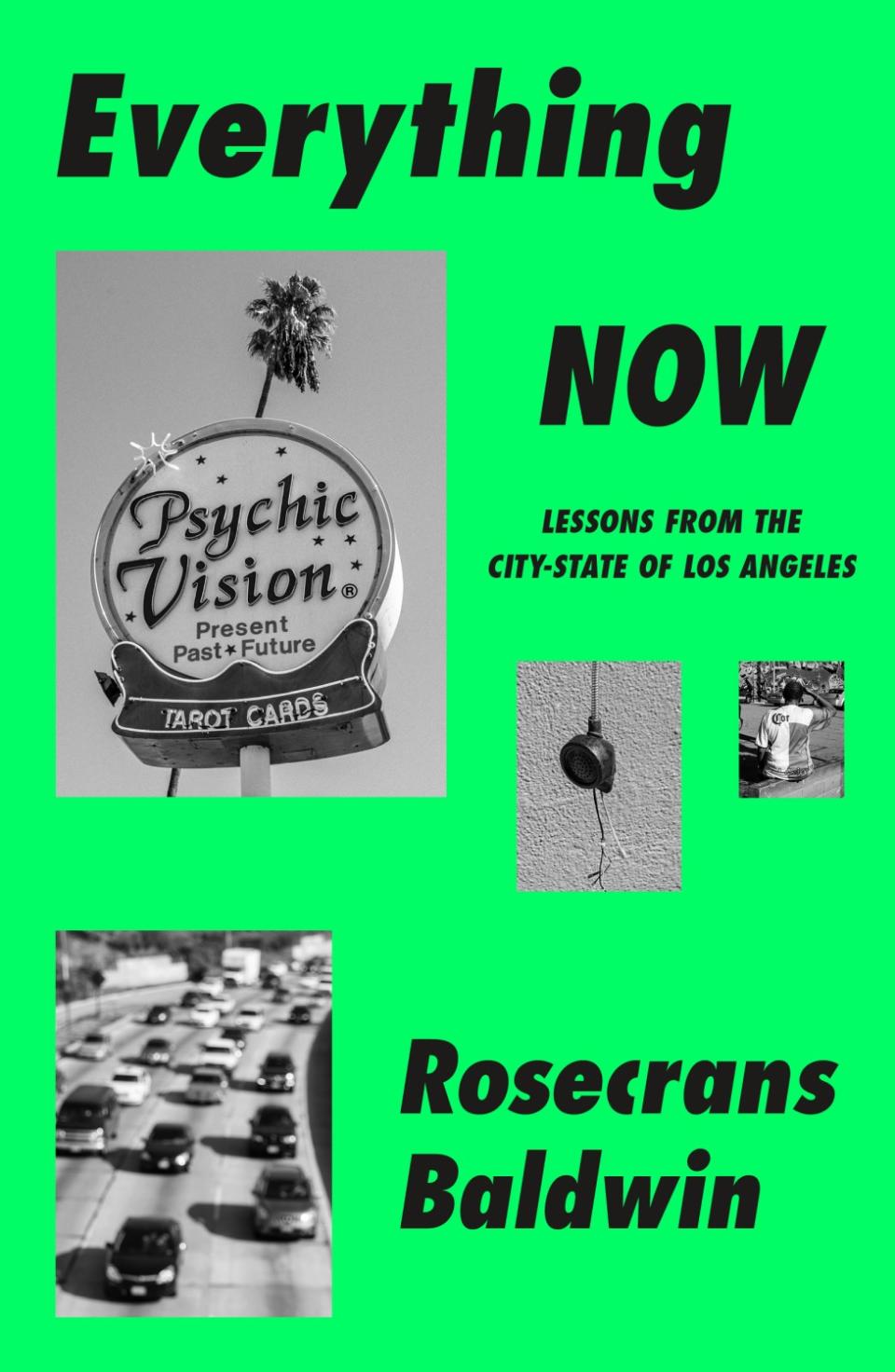Another transplant's book on L.A.: Does Rosecrans Baldwin know his stuff?

- Oops!Something went wrong.Please try again later.
What shape is Los Angeles in — literally? What does the silhouette of the city resemble on a map? Picture the real boundaries of the city: the long drop from downtown to San Pedro, the rumpled blanket flung to the north and west, with all the South Gates and Santa Monicas of our amorphous county jigsawed away. What does it look like to you?
To me, L.A. sometimes looks like an east-facing saddle; other times like a west-facing, rage-ruffled parrot. Now comes Rosecrans Baldwin, on Page 4 of his new book about the city, likening the outline of L.A. to “a palm tree blown west by heavy winds.”
Nailed it.

Baldwin is the author of a couple of well-reviewed novels, a nonfiction book about living in Paris, scads of articles for GQ and other magazines and a newsletter called “Meditations in an Emergency,” about whatever he finds beautiful in any given week. (And yes, that’s his real name.) He’s also just written “Everything Now: Lessons From the City-State of Los Angeles,” an impressionistic, ambivalent, interview-heavy, judgment-light book of reportage about L.A. today that’s exactly the kind of book I normally hate.
You know the sort of nonfiction I mean. Some hack parachutes into town, figures L.A. out in five minutes and sells it to some gullible editor in New York who wouldn’t know a coyote if it bit him in the Waldorf Astoria. Steve Martin once wrote a great parody of this phenomenon, a story called “Hissy Fit.”
Well, Baldwin was born in Chicago, not L.A., grew up in Connecticut and got here only a few years ago. (Raymond Chandler was born in Chicago and didn’t move out here until he was 25, but shut up.) He also gets a few things wrong, like listing great tennis players from L.A. and leaving out Pancho Gonzalez. Most annoying of all, his book is actually pretty good.
To compound the insult, when I met Baldwin, I more or less liked him. He’s smart and funny, and you can tell he’s interviewed plenty of people himself. Sometimes he’ll keep circling a topic — absently rubbing his face as if trying to coax out a genie — until he finally succeeds in saying just what he means.
We tanked up on coffee at La Monarca and sat down inside Libros Schmibros, the lending library I run in Boyle Heights, to talk about L.A. and his book. Our conversation has been edited for clarity [among other reasons].

Is this on? I’ve been using this new transcription app that supposedly can almost read your mind.
I hate transcribing. I feel like, especially for this book, I’ve been transcribing now for years.
[There, that softened him up. Now I’ll expose him as a lightweight.] In “Everything Now,” you call Los Angeles a city-state. What city-state does L.A. most remind you of?
I would argue that we are a blend of contemporary Singapore and historic Florence. There are more trade flows to Los Angeles for the United States than anyplace else. Florence combined robust burgeoning trade with these wealthy families that could pull strings behind the scenes — for example, the Medicis.
In Los Angeles, you have people like Eli Broad or Elon Musk that can come along, and things just happen. The idea that Musk can be like, “I just want to start digging in the ground and install rocket ships underneath our feet,” and Hawthorne, within a year or two, is like, “Yep.” That's, I mean, that's bonkers.
[Hmmm. Quick, throw him a softball and regroup.] Who’s your dream reader for this book?
This may sound a little cheesy. My dream reader is someone who doesn't look like me or someone that doesn't come from where I come from. I remember saying early on to my editor that I hoped this book would meet people who are from Los Angeles — they know it in their bones, but maybe they don't know everything about Los Angeles — and they would pick up this book and learn things and find L.A. even more interesting than they thought it to be. I would love for that to happen.
What’s an L.A. experience you’ve had this year that might be new to your ideal reader? [Not me, understand, but one who doesn’t “know everything about Los Angeles.”]
I’m trying to think if I can get in trouble for this… You can't technically, legally, have bonfires on the beach these days. If you go to Dockweiler, they removed all the fire pits right at the beginning of lockdown. But a friend of ours had told us that if you go down right at sunset, the lifeguards go away. And so we went down, and it was my birthday, and we had oysters, and we hung out on the beach, and the sun went down, and we had brought wood.
We dug a hole in the sand and started a little fire. And you look up the beach, and it was that magical purple orange — the sun has set, but it's still light — and all these fires started igniting in a line down the beach, and it was just the coolest.
[Why haven’t I heard about that? Oh, well, at least I’ve read more books about L.A. than he has.] Do you know Tom Hayden’s autobiography, “Reunion”? By the end, it feels like Hayden’s achieved this equanimity about his life, and then the book comes out and, next thing you know, he and Jane Fonda are getting divorced. So now that you’ve made your statement about L.A., do you feel like you’re in any danger of kicking over the traces and fleeing?
I don't see myself losing interest in Los Angeles. If you don't make an effort, Los Angeles won't make an effort either. Los Angeles is not a hostess in a restaurant. No, you need to want to experience more of L.A. before L.A. gives it to you. But once you show desire, I feel like the return can be huge…
I just don't think I'll ever be able to afford to buy anything here.
[I give up. He really does get it.] Take this book forward a handful of years — say, just arbitrarily, to the Olympics in 2028. Where do you think L.A. might be headed by then?
I don't know, but I get scared. A lot of business interests will be inclined to hide things about Los Angeles as the Olympics come to town, and that's not going to improve life for people whose lives are being hidden.
I am really impressed by people that are genuinely working to make Los Angeles a better place to live. And I don't know that politicians always have that at heart.
Who do you see working to make Los Angeles a better place? [Anybody we know, perchance?]
Dude, tons of people that I talked to for this book. Arts organizations. Social workers. Firefighters I met when I was volunteering at Dodger Stadium. Just people who are doing their own thing, but often do it in ways that help other people — and aren't about money.
It’s a hokey answer, but it is real.
Kipen is the author of “Dear Los Angeles: The City in Diaries and Letters, 1542-2018” and the founder of Libros Schmibros.
This story originally appeared in Los Angeles Times.

